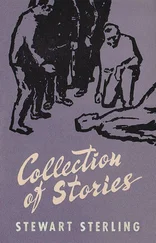The guest signed the registration card with a flourish.
“Are you going to be with us long, Mr. Moody?” the clerk asked.
“It better not be too long,” was the enigmatic answer, “or I’m in trouble.”
“Take the gentleman up, Joe,” hosted the clerk, motioning to a bellboy.
Joe began collecting the articles one by one.
“Wait a minute, not Gertie!” he was suddenly instructed.
Joe looked around, first on one side, then on the other. There was no one else standing there. “Gertie?” he said blankly.
Young Mr. Moody picked up the portable typewriter, patted the lid affectionately. “This is Gertie,” he enlightened him. “I’m superstitious. I don’t let anyone but me carry her when we’re out on a job together.”
They entered the elevator together, Moody carrying Gertie.
Joe held his peace for the first two floors, but beyond that he was incapable of remaining silent. “I never heard of a typewriter called Gertie,” he remarked mildly, turning his head from the controls. “I’ve worn out six,” Moody proclaimed proudly. “Gertie’s my seventh.” He gave the lid a little love-pat. “I call them alphabetically. My first was Alice.”
Joe was vastly interested. “How could you wear out six, like that? Mr. Elliot’s had the same one in his office for years now, ever since I first came to work here, and he hasn’t wore his out yet.”
“Who’s he?” said Moody.
“The hotel accountant.”
“Aw-w-w,” said Moody with vast disdain. “No wonder. He just writes figures. I’m a writer.”
Joe was all but mesmerized. He’d liked the young fellow at sight, but now he was hypnotically fascinated. “Gee, are you a writer?” he said, almost breathlessly. “I always wanted to be a writer myself.”
Moody was too interested in his own being a writer to acknowledge the other’s wish to be one too.
“You write under your own name?” hinted Joe, unable to take his eyes off the new guest.
“Pretty much so.” He enlarged on the reply. “Dan Moody. Ever read me?”
Joe was too innately naive to prevaricate plausibly. He scratched the back of his head. “Let me see now,” he said. “I’m trying to think.”
Moody’s face dropped, almost into a sulk. However in a moment it had cleared again. “I guess you don’t get much time to read, anyway, on a job like this,” he explained to the satisfaction of the two of them.
“No, I don’t, but I’d sure like to read something of yours,” said Joe fervently. “Especially now that I know you.” He wrenched at the lever, and the car began to reverse. It had gone up three floors too high, so intense had been his absorption.
Joe showed him into Room 923 and disposed of his encumbrances. Then he lingered there, unable to tear himself away. Nor did this have anything to do with the delay in his receiving a tip; for once, and in complete sincerity, Joe had forgotten all about there being such a thing.
Moody shed his tent-like topcoat, cast it onto a chair with a billowing overhead fling like a person about to immerse in a bath. Then he began to burst open brown paper with explosive sounds all over the room.
From the flat square came an equally flat, equally square cardboard mat, blank on the reverse side, protected by tissues on the front. Moody peeled these off to reveal a startling composition in vivid oil-paints. Its main factors were a plump-breasted girl in a disheveled, lavender-colored dress desperately fleeing from a pursuer, the look on whose face promised her additional dishevelment.
Joe became goggle-eyed, and remained so. Presently he took a step nearer, remaining transfixed. Moody stood the cardboard mat on the floor, against a chair.
“You do that?” Joe breathed in awe.
“No, the artist. It’s next month’s cover. I have to do a story to match up with it.”
Joe said, puzzled, “I thought they did it the other way around. Wrote the story first, and then illustrated it.”
“That’s the usual procedure,” Moody said, professionally glib. “They pick a feature story each month, and put that one on the cover. This time they had a little trouble. The fellow that was supposed to do the feature didn’t come through on time, got sick or something. So the artist had to start off first, without waiting for him. Now there’s no time left, so I have to rustle up a story to fit the cover.”
“Gee,” said Joe. “Going to be hard, isn’t it?”
“Once you get started, it goes by itself. It’s just getting started that’s hard.”
From the bulkier parcel had come, in the interim, two sizable slabs wrapped alike in dark-blue paper. He tore one open to extract a ream of white first-sheets, the other to extract a ream of manila second-sheets.
“I’m going to use this table here,” he decided, and planted one stack on one corner of it, the second stack on the opposite corner. Between the two he placed Gertie the typewriter, in a sort of position of honor.
Also from the same parcel had come a pair of soft houseslippers, crushed together toe-to-heel and heel-to-toe. He dropped them under the table. “I can’t write with my shoes on,” he explained to his new disciple. “Nor with the neck of my shirt buttoned,” he added, parting that and flinging his tie onto a chair.
From the slender pocket-slanted oblong, last of the wrapped shapes, came a carton of cigarettes. The pipe, evidently reserved for non-occupational hours, he promptly discarded.
“Now, is there an ashtray?” he queried, like a commander surveying an intended field of action.
Joe darted in and out of several corners of the room. “Gee, no, the last people must have swiped it,” he said. “Wait a minute, I’ll go get—”
“Never mind, I’ll use this instead,” decided Moody, bringing over a metal wastebasket. “The amount of ashes I make when I’m working, a tray wouldn’t be big enough to hold it all anyway.”
The phone gave a very short ring, querulously interrogative. Moody picked it up, then relayed to Joe, “The man downstairs wants to know what’s holding you, why you don’t come down.”
Joe gave a start, then came down to his everyday employment level from the rarefied heights of artistic creation he had been floating about in. He couldn’t bear to turn his back, he started going backward to the door instead. “Is there anything else—?” he asked regretfully.
Moody passed a crumpled bill over to him. “Bring me back a — let’s see, this is a cover story — you better make it an even dozen bottles of beer. It relaxes me when I’m working. Light, not dark.”
“Right away, Mr. Moody,” said Joe eagerly, beating a hasty retreat.
While he was gone, Moody made his penultimate preparations: sitting down to remove his shoes and put on the slippers, bringing within range and adjusting the focus of a shaded floor lamp, shifting the horrendous work of art back against the baseboard of the opposite wall so that it faced him squarely just over the table.
Then he went and asked for a number on the phone, without having to look it up.
A young woman answered, “Peerless, good evening.”
He said, “Mr. Tartell please.”
Another young woman said, “Mr. Tartell’s office.”
He said, “Hello, Cora. This is Dan Moody. I’m up here and I’m all set. Did Mr. Tartell go home yet?”
“He left half an hour ago,” she said. “He left his home number with me, told me to give it to you; he wants you to call him in case you run into any difficulties, have any problems with it. But not later than eleven — they go to bed early out there in East Orange.”
“I won’t have any trouble,” he said self-assuredly. “How long have I been doing this?”
“But this is a cover story. He’s very worried. We have to go to the printer by nine tomorrow — we can’t hold him up any longer.”
Читать дальше












